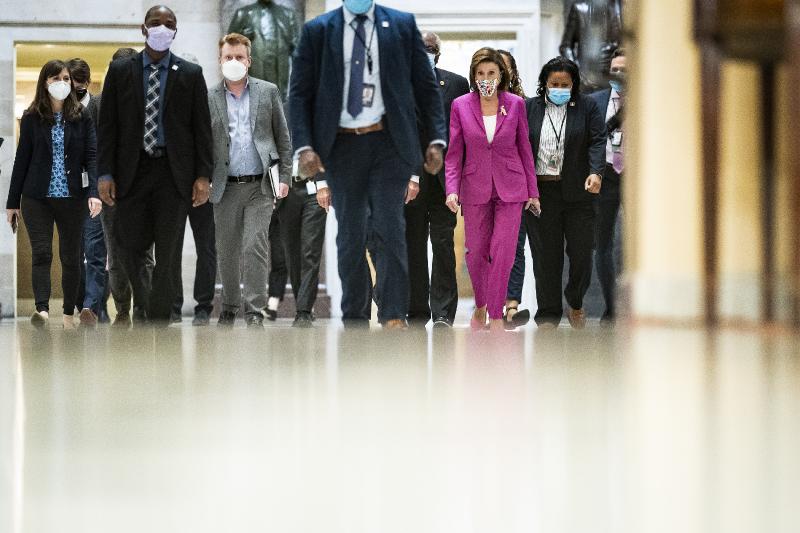What does infrastructure package's passing mean for the Democrats' bigger social spending bill?



In a months-long saga that concluded Friday with Congress approving a major investment in American infrastructure, one of the most remarkable moments came in September, when a group of about 100 House liberals threatened not to support the infrastructure package if House Speaker Nancy Pelosi (D-Calif.) held a vote on it before their more liberal priorities.
At the same time, a smaller group of moderate House Democrats threatened not to vote to move forward on their party's social safety net/climate change legislation if infrastructure didn't get a vote ASAP.
Two poles of the Democratic Party were each delaying key pieces of President Biden's agenda, mistrustful of the other side. Passing major legislation is difficult and divisive, especially when one party has such slim majorities in both chambers of Congress, as Democrats do now.
But as Democrats celebrate approving $1.2 trillion in investments in the nation's roads, bridges and broadband, it's worth reflecting that a sizable chunk of lawmakers in the party held up a key portion of Biden's agenda for months.
This infrastructure legislation had already passed the Senate, and House liberals were all that stood in the way of it going to Biden's desk to be signed into law. After that September showdown, they ended up holding it up for two more months. (So messy was the Democratic infighting that at one point the president himself came to the Hill and shocked moderate Democrats by urging the party to hold off on voting on his infrastructure legislation until they could get a deal on that more liberal social safety net package.)
Democrats' failure to pass at least the infrastructure bill sooner probably contributed to their party losing the Virginia governor's race on Tuesday. All the intraparty drama doesn't just go away with Friday's vote, as Democrats now try to pass an even more contentious piece of legislation — that social safety net bill, which is a major expansion of the federal safety net in all areas of Americans' lives, plus a historic investment in mitigating the effects of climate change.
Among the hurdles that remain:
- How much will the bill cost? The infrastructure legislation only got a vote Friday after a tenuous deal: A promise from about five moderate House Democrats to their liberal counterparts that they will vote on the $1.75 trillion social spending package after the Congressional Budget Office analyzes its financial impact. But what if these House Democrats don't like the financial impact of this legislation? CBO scores have derailed legislation before, most notably Republicans' efforts a few year ago to repeal Obamacare. (The CBO estimated that Republicans' plan would leave 22 million more Americans uninsured.)
- Democrats have less room to maneuver than they did with the infrastructure bill. Democrats are trying to pass the second major plank of Biden's agenda with just Democratic votes. That means they simply have fewer votes to work with. On Friday, six Democrats voted against the infrastructure legislation. That would have been enough to sink the social safety net bill. Pelosi has just three votes to spare in the House. (Thirteen Republicans voted for the infrastructure package, mitigating the effects of those six "no" votes.) In the Senate, Democrats have zero votes to spare. "Every senator is a president," Biden has said of the dynamic in the Senate where just one "no" vote from someone in his party is enough to kill the deal.
- The Senate. Let's say those hurdles are cleared, and Democrats' social safety net legislation passes the House. It still needs to pass the Senate. And liberals held up Biden's infrastructure legislation for months precisely with the goal of getting moderate senators such as Sens. Joe Manchin III (D-W.Va.) and Kyrsten Sinema (D-Ariz.) onboard with their bill. That hasn't worked. On Friday, House liberals got no such commitment from the Senate Democrats that they'll vote for the social safety net bill as is after the CBO weighs in. Previously, Manchin told CNN that he has concerns about how the bill's tax policy is set up, immigration policies, a Medicare expansion and some of its renewable energy proposals. So, just a few things. "If you resolve all those, you should be able to come to an agreement," he said.
- There's another fiscal cliff coming in December. Even Manchin is optimistic that Democrats can get the second part of Biden's agenda passed before Thanksgiving. But if that isn't the case — Democrats have missed many, many deadlines they've set for themselves throughout this process — it could collide with some major fiscal fights. In early December, Democrats have to figure out a way to pass another spending bill to keep the government open and to raise the debt ceiling over Republican objections. They would love to have a social safety net bill done before those big spending fights. If they don't, those fiscal dramas will have to take priority.
Deals can come together quickly in Washington. And Democrats are particularly spurred to act after their bad Election Day on Tuesday. But a number of major hurdles remain, and liberal Democrats in particular held up an infrastructure bill for months without getting much in return.






I do not expect the current $3+ trillion bill to pass. What might pass is a further reduced bill but I doubt we will see such a bill.
I am quite satisfied with the infrastructure bill. Biden should work on that for the rest of his term. Just maintaining while genuinely working on reducing the divisiveness in the nation would be an excellent thing for Biden to do
I agree.
That seems overly optimistic to me, given the divide in his own party right now.
It is overly optimistic. But, nonetheless, this is what I think would be best for Biden and the nation.